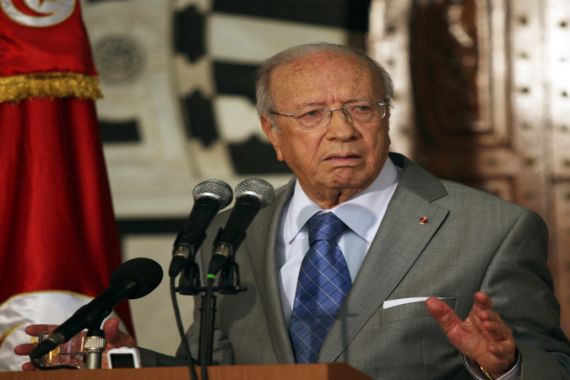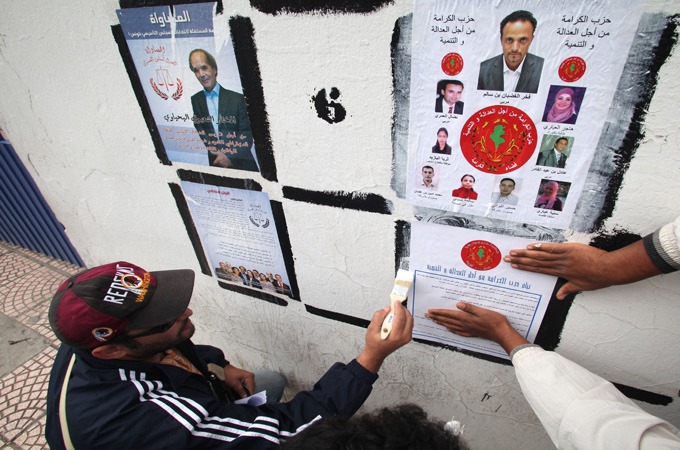Cynicism marks Tunisia election lead-up
Many Tunisians are disillusioned by the lack of real change on the ground since Zine al-Abidine Ben Ali was ousted.
Published On 17 Oct 2011

 |
| The vote on October 23 could be the first in decades that is considered free and fair [EPA] |
Today, Tunisia stands on the verge of history, ready to embark on a new democratic path. Nearly nine months after the popular uprising that transformed the political map of the Arab world, Tunisians are about to determine the shape of the democracy to be born on October 23.
After months of uncertainty, the election campaign finally kicked off on October 1, unleashing a novel phenomenon in the country’s history – a real election campaign. Over 80 parties have taken to the road, campaigning to convince seven million voters to put their trust in them – a trust that is hard to find in a country that has lived through corruption, brutality and countless empty promises.
In fact, only half those eligible to vote have registered to do so, a sign perhaps of deeply ingrained cynicism. During a recent visit there, a common complaint I came across was that the revolution had achieved little and that “we need a second revolution to save the first”.
The optimism I witnessed in January, immediately following Zine El Abidine Ben Ali’s fall, has faded into a jaded scepticism. The disappointing performance of the interim government has not helped matters. Made up largely of the same ageing bureaucrats who ruled the country through decades of dictatorship, and are accustomed to regarding people as mere subjects rather than citizens.
Unaccountable bureaucrats
They are completely unable to adapt to the realities of a new Tunisia in which citizens are daring to demand their rights and expect accountability. The 84 year-old interim Prime Minister, Beji Caid Sebsi, a relic from the previous era, has lamented this new irreverent behaviour and reinstated emergency laws, demanding a return to the good old days of “deference to the state”, while the Interior Minister recently reprimanded protesters, demanding they set aside their “selfish” demands for a decent wage and working conditions.
After nine months, not a single member of the security forces has been imprisoned for their crimes. Mothers continue to see the men who shot their sons walking around their neighbourhood.
Many of the hundreds of young people injured in the protests remain without basic medical care – Rashad, a wheelchair-bound young man who suffered permanent injuries when beaten by security forces during the January protests, and whose brother was shot dead, is still waiting to see justice:
“How can we see the same people who mired the country in corruption still ruling, enjoying full immunity. Why is no authority holding them to account? The only thing that has saved them is that we are a forgiving nation. If we had done what all other revolutions did, they would have been strung up, but they’ve been saved. The government is still neglecting our youth. All the businessmen who enjoyed advantages are still enjoying them. And let’s not forget the security forces and all the offences they committed against the people – where is the policeman who fired the bullet that killed my brother? They are known, they are still walking around.”
Rashad continues to wait for an operation for the injuries he sustained and says the government has given him little assistance.
Despite the appearance of change, Tunisia’s political system remains in the grip of those same individuals and forces that enjoyed unbridled power for so long, and they are determined not to let go. Every trick in the book has been deployed to prevent these elections taking place – from threatening chaos and coups to delaying the elections and even proposing a referendum to significantly restrict the role of the new legislature.
A democratic future?
But after months of subterfuge, we finally stand just days from the all-important elections that will frame Tunisia’s future.
The election campaign has sparked a reawakening among the electorate, as 11,000 candidates take to the streets and airwaves to win them over. For the first time, Tunisians are being courted for their vote, presented with different political options and asked to choose. For the first time, the result is not known before a single ballot is cast.
After decades of silence, the sight of armies of volunteers distributing leaflets, knocking on doors and papering the walls with posters is a beautiful one to behold. Having long lived in a seasoned democracy in which the right to vote is taking for granted, it is utterly thrilling to experience democracy anew, to see it as if for the first time and truly understand its fundamental significance. The very act of choosing is giving Tunisians the chance to experience what they had risked their lives for – a sense of dignity and self-respect.
However, while trust in politics may be low, expectations are sky-high. The revolution was a response to deep problems that still plague Tunisia – an unemployment rate of nearly 20 per cent, corruption and cronyism, vast regional inequalities, an elite network of businessmen who have the economy and media firmly within their grasp.
Resolving these problems will take decades, even with the right policies and investment, but people are impatient. Seven hundred thousand unemployed graduates expect jobs that will finally allow them to put their skills to use. Thousands of unemployed single men in their 30s and 40s still living with their parents and surviving on pocket money are waiting to start the dignified, independent lives of which they had long dreamed.
Tunisians accept that every revolution creates a counter-revolution and that achieving the real change they want will take hard work. Their revolution was not for a mere change of faces, but for a real change in governance that puts in place a new relationship between state and citizen, based on consent and accountability. If these expectations are to be fulfilled, it is not only the state that must change but also the people.
It is clear that many Tunisians are still awaiting a saviour who will lift the country out of its woes. But if the people are to enjoy sovereignty, they must embody it.
As Malik Bennabi wrote, “[Democracy] is the generation of an attitude, and of objective and subjective responses and standards that collectively laid the foundations upon which democracy, prior to being stated in any constitution, stands in the conscience of the people.”
The outpouring of energy unleashed by the revolution must now be poured into building institutions in which all can participate and trust. The central demands of accountability, transparency, dignity and justice cannot be achieved without constant vigilance and pressure by society coming together through independent citizens’ organisations, human rights institutions, trade unions, thinktanks and watchdogs.
When the world’s attention moves on after October 23, Tunisians will have the daunting task of systematically dismantling an elaborate structure of dictatorship within which they had long been imprisoned and building a new democratic framework.
While they may now look to Turkey, Europe and further afield for inspiration, who knows, perhaps they may soon be a model for those struggling for freedom across the region.
Intissar Kherigi studied Law at King’s College, Cambridge, then specialised in human rights at the Centre for the Study of Human Rights, London School of Economics. She has worked in the House of Lords, the United Nations in New York, and the European parliament in Brussels.
The views expressed in this article are the author’s own and do not necessarily reflect Al Jazeera’s editorial policy.
